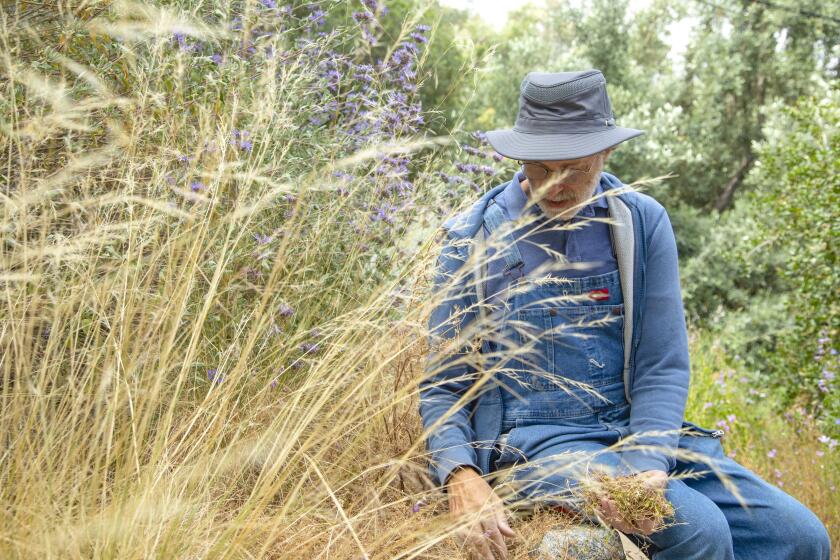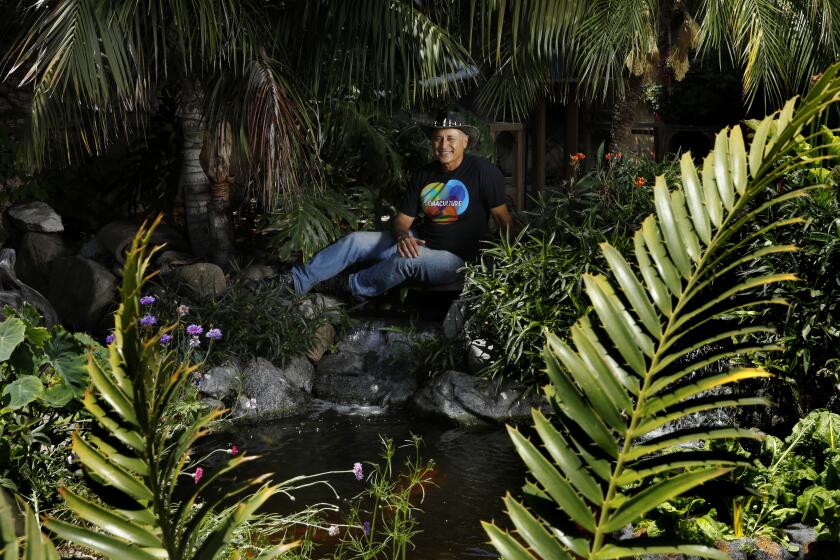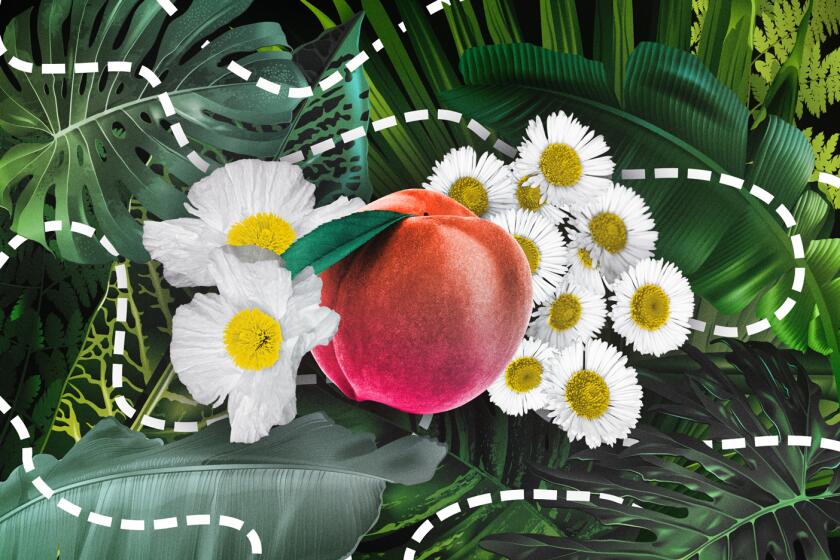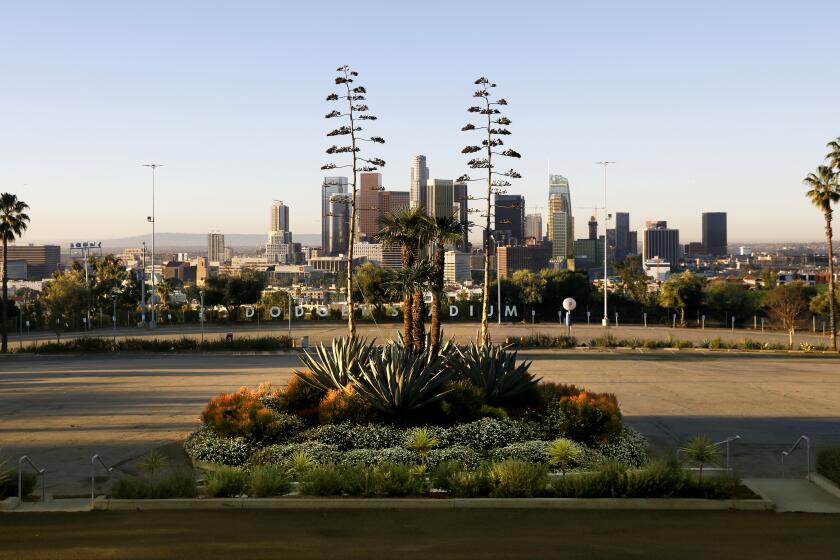Learn how to kill lawns for good while saving these nuns from crushing water bills
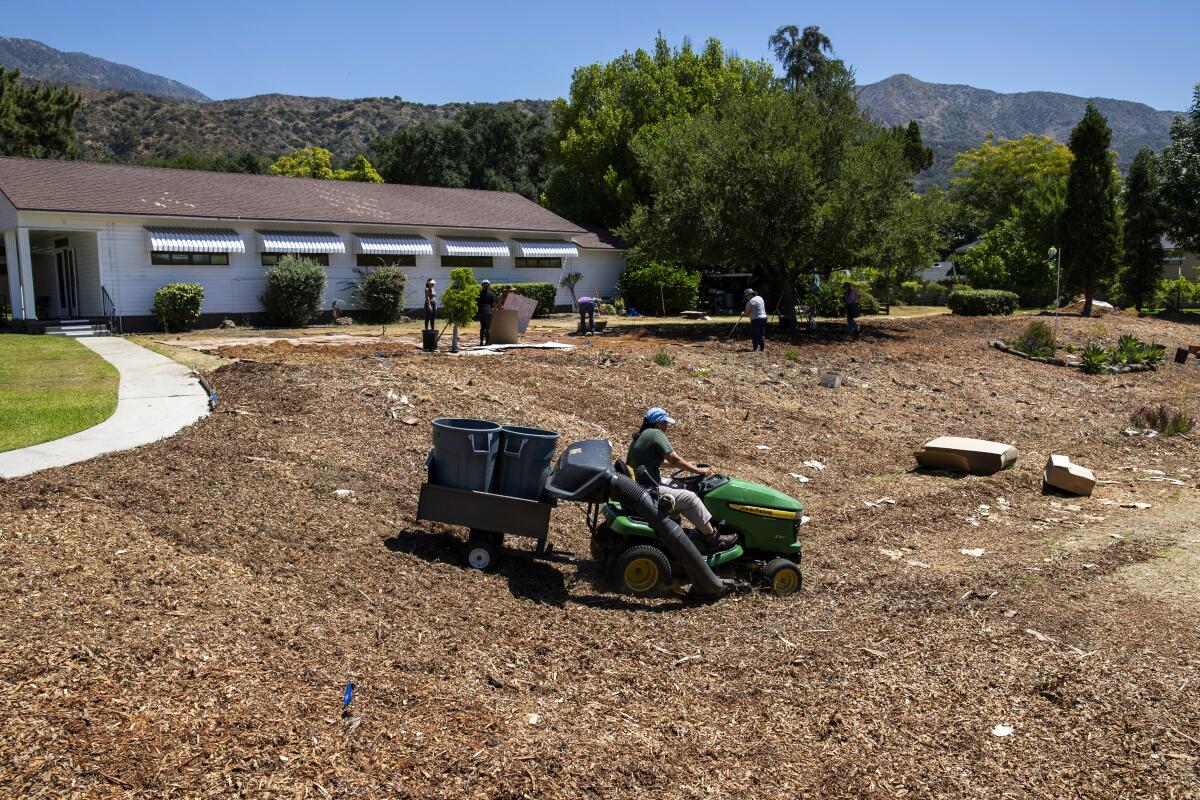
- Share via
Once upon a time, the grounds surrounding the Maryknoll Sisters home in Monrovia were 6.5 acres of lushly green lawn and trees.
They’ll never be that way again — not with water being so rare and expensive these days — but the retired nuns of Maryknoll Sisters of St. Dominic, about 15 former nurses, teachers and social workers in their 80s and 90s, are working with Grow Monrovia and other conservation activists to find a better use for their land.
Their vision involves converting the mostly dead and dying lawns “to something more suitable to the environment here,” said Sister Arlene Trant, 76, coordinator of the order’s retirement facility. Their goals for the new landscape include meadows of native plants, grasses and trees, and community gardens growing food, using methods that conserve water, harvest rainfall and rebuild the soil.
There’s no budget for contractors or laborers though. Rather, they see the transformation as an ongoing series of workshops in water optimization and soil regeneration, where people can participate in the conversion while learning how it’s done.
Bottom line: This small group of elderly nuns who spent most of their lives living and working with people with disabilities and without resources, are relying on the kindness and curiosity of volunteers to complete the first part of this transformation through hands-on workshops in lasagna mulching (a.k.a. sheet mulching) on July 10 and 24 from 8 a.m. to noon both days at 300 Norumbega Drive in Monrovia.
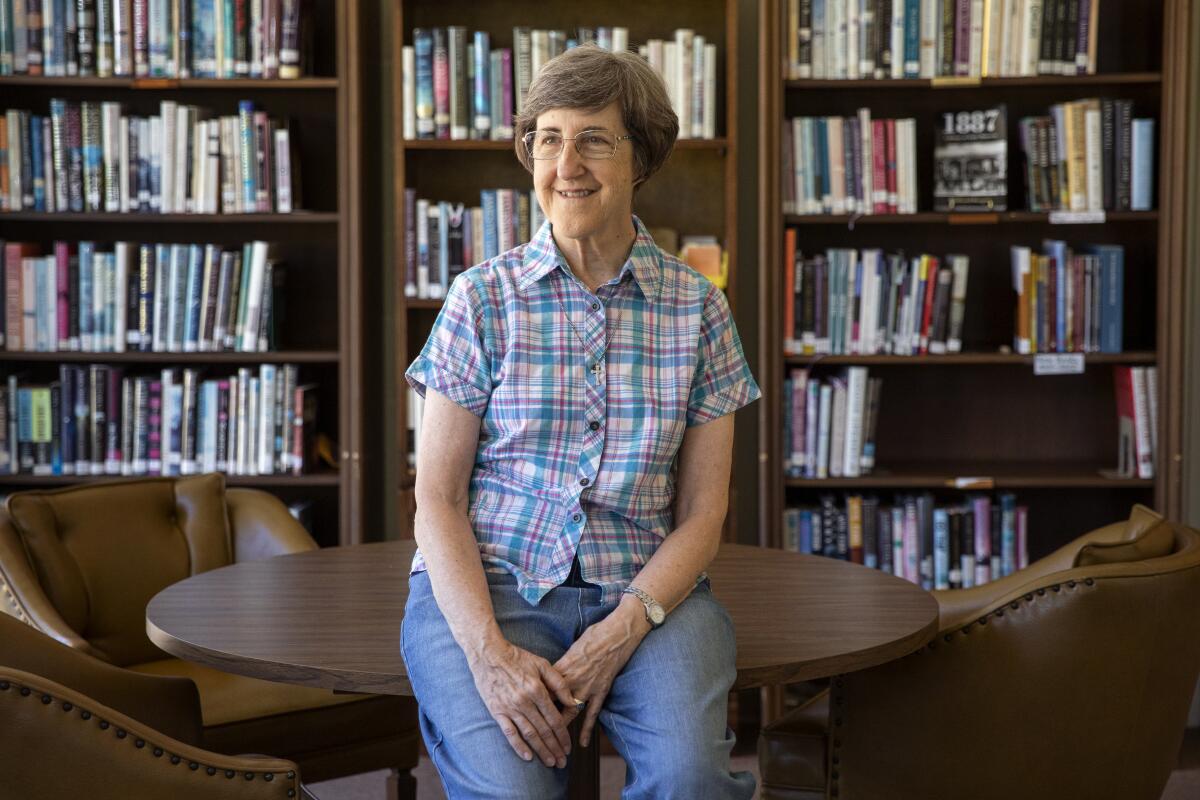
The free workshops, organized by the local conservation nonprofit group Grow Monrovia, are led by landscape designer and activist Leigh Adams of Studio Petrichor, a company focused on reversing climate change by rebuilding landscapes with healthy soil and native plants.
Adams created the popular Crescent Farm at the Los Angeles County Arboretum and Botanic Garden in 2015 by using sheet mulching and other techniques to transform an old lawn into a low-water garden of native plants, fruit trees and other foods. Her classes about water optimization and replacing lawns with cardboard and wood chips to create a healthy soil have inspired Trant and given new purpose to the residents, whose community work has been limited the last two years due to the pandemic.
“Saint Francis of Assisi spoke about Brother Sun and Sister Moon,” Trant wrote in a statement about the project. “To me, what we’re doing here is working in solidarity with Brother Worm and Sister Microorganisms. Caring for Mother Earth means joining the birds, butterflies, worms, bees and microorganisms who are all essential workers in caring for our land and nurturing the soil for future generations.”
Native plant gardens can look dead over the summer, but there are things you can do to tend to the dried-out vegetation.
It’s a new chapter for the facility that the Maryknoll Sisters began as a tuberculosis sanatorium in the 1920s for Japanese patients no other medical centers would treat. It later became a small hospital for the underserved in the San Gabriel Valley, and in the 1970s was converted to a retirement residence for the New York-based order’s nuns.
Trant, 76, spent most of her life working with the Deaf community and people with disabilities in Hong Kong and Macau. Nothing was green in those densely populated cities, she said, so on her brief visits to Monrovia, the shady verdant grounds seemed miraculous.
She loved those “beautiful water-sucking lawns,” Trant said, but she now sees them as unsustainable in Southern California — and far too expensive for her cash-strapped facility to irrigate.
In the spring, with help from Adams and neighbors Rosemary Gavidia and Michele Brooke, the founders of Grow Monrovia and the Maryknoll Sisters started the first part of their project, applying for rebate money to remove 20,000 square feet of patchy grass.
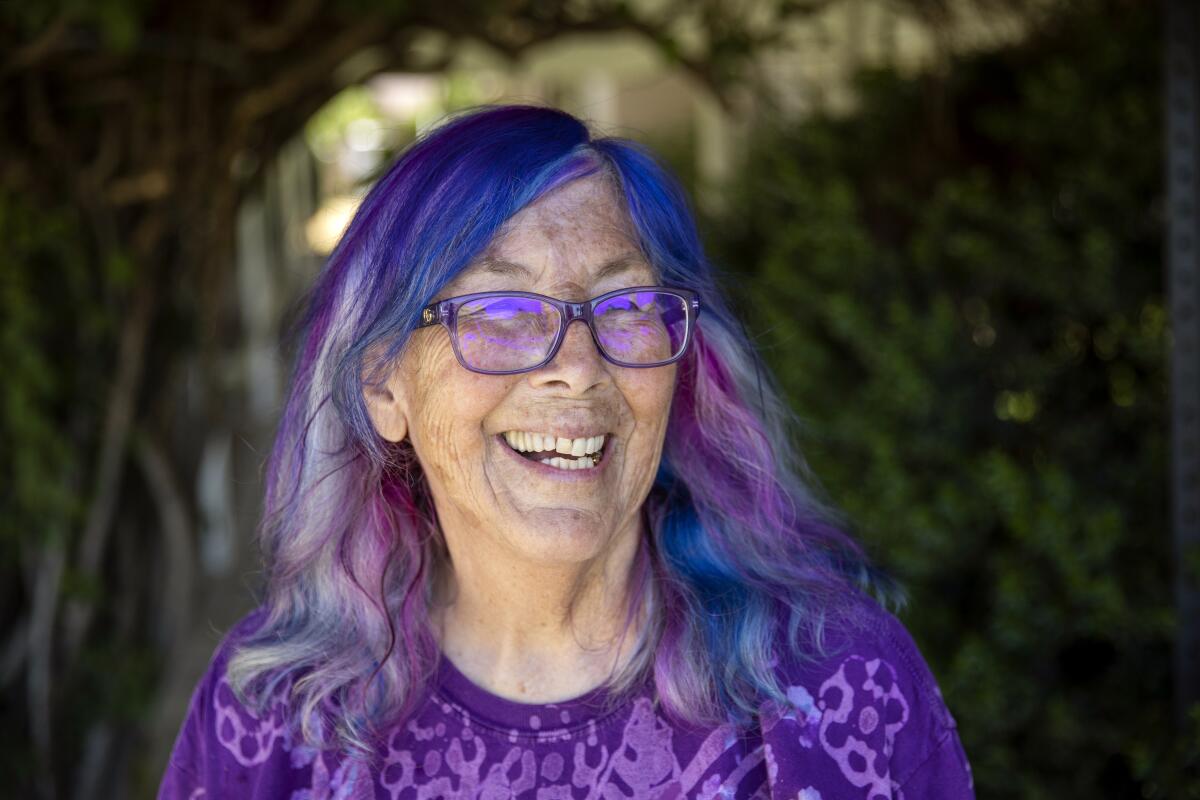
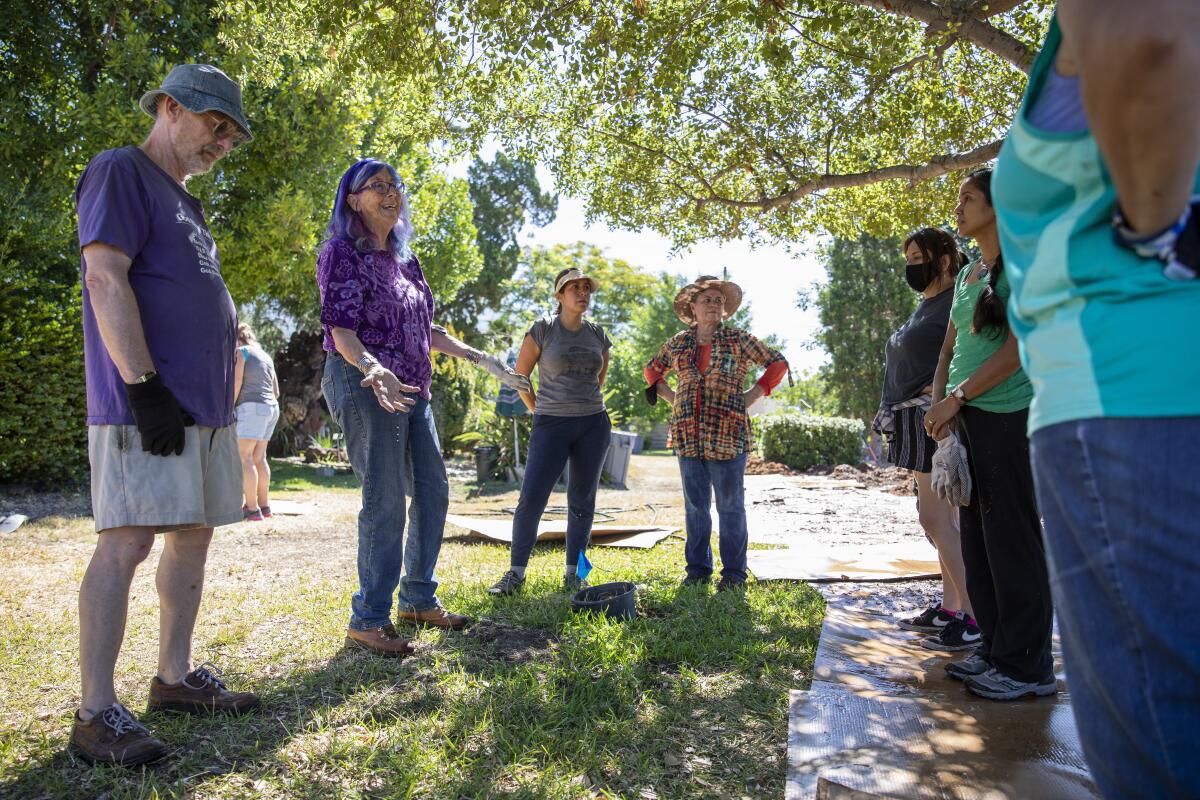
The rebate money will be useful, Trant said, “but it’s not about the rebate. It’s about the cry of the Earth. We’ve neglected her for so many years, now we want to get in tune to what she’s calling us to do.”
Replacing lawns with drought-tolerant plants is a good start in dry Southern California. Setting up a recycled water system is even better.
Brooke and Gavidia are excited about the opportunity to get the public involved in lawn-removal techniques they can apply to their own yards. They have been growing trees to plant around Monrovia for several years, and got involved with the sisters in 2021, after getting Trant’s permission to create a small community garden and tree nursery on a weedy, unused portion of their land, near a grove of oaks.
Gavidia hopes the rebate money can help the sisters continue the project, buy more materials and pay Adams for her landscape designs, but Adams is a huge proponent of community involvement and she says she’s donating her time, in part because Catholic nuns kept her alive after she was born in Hanford, Calif.
When Gavidia told Adams about the Maryknoll Sisters’ project, “I realized it was like a cosmic score card where I could even things out,” Adams said. “These are women who have served their communities all their lives and they need help. I’m not Catholic — I’m not even religious — but 72 years have passed and the reason I’m here and thriving is because some nuns in that hospital took care of me when my mother didn’t. They have a vision to help the Earth and I have a way to organize the community and help them learn.”
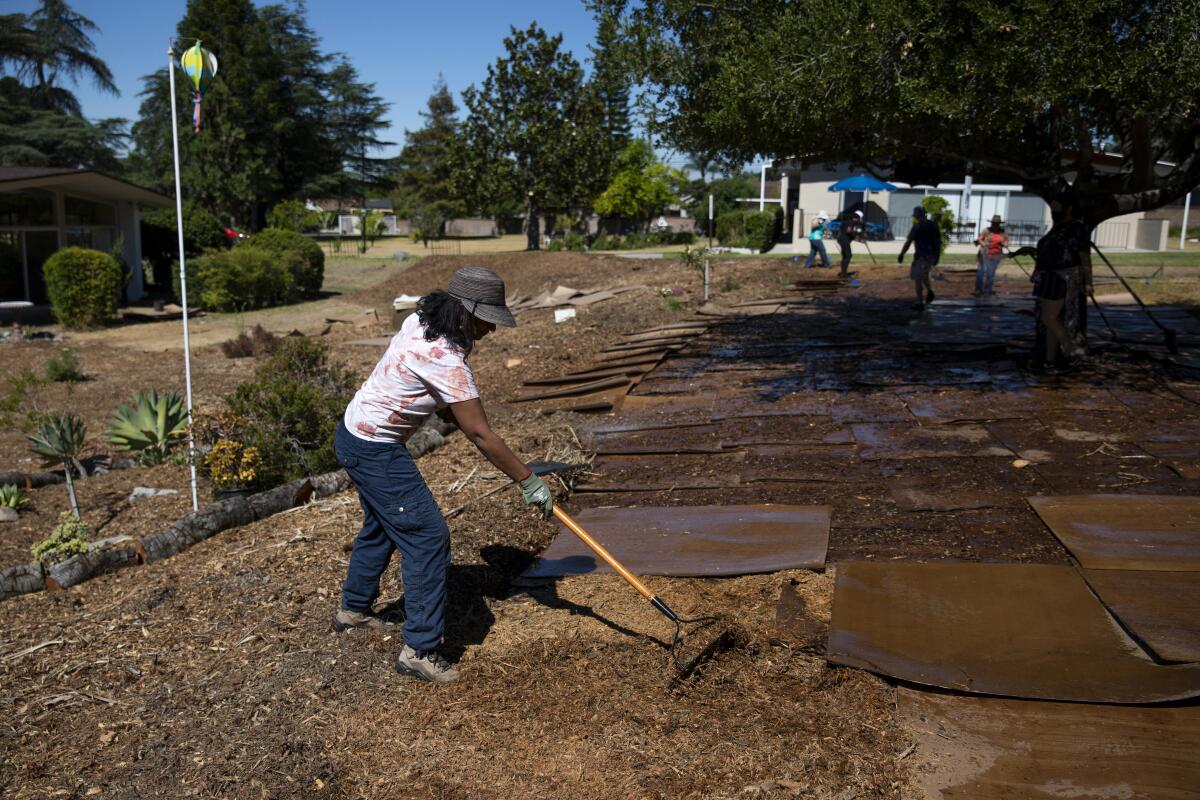
These workshops are just one of many ways you can get your landscaping squared away. Check out these other plant- and garden-related events and activities in July too. Email events to [email protected] at least three weeks before they happen, and we might include them in the calendar.
More things to do for plant lovers in July
July 2
Monarch Nature Trail Volunteer Day, organized by the UC Cooperative Extension Master Gardeners of Orange County. Learn about Orange County’s butterfly population and the native plants they need to survive while helping to maintain the trail by collecting seeds, mulching, weeding and other activities for children and adults from 9 to 11 a.m. at 5302 Rancho Road in Huntington Beach. Participants should wear tennis shoes and sunscreen and bring a hat and water. Note that no restrooms are available at the site. Admission is free. mgorange.ucanr.edu
July 2-3
The Cactus and Succulent Society of America presents its 55th Cactus and Succulent Show and Sale, 10 a.m. to 5 p.m. both days at the Brody Botanical Center at the Huntington Library, Art Museum and Botanical Gardens, 1151 Oxford Road in San Marino. Free with general admission to the gardens but advance online timed-entry reservations are required on weekends for visitors and members. Tickets are $25, ($21 for seniors 65+, active military and students with ID, $13 for children ages 4-11. Members and children under 4 enter free.)
Even California native plants can dry out in the summer. But these varieties will still look good in Los Angeles yards and gardens during the hottest months.
July 7
Native Plant Maintenance Basics, a walk-and-talk class from 8:30 to 9:30 a.m. at the Theodore Payne Foundation pergola, 10459 Tuxford St. in Sun Valley. Native plant enthusiast Erik Blank, a member of the Theodore Payne Foundation’s nursery staff, provides an overview of summer maintenance practices for California native plants. Participants should bring water and wear sunscreen, long pants and closed-toe shoes for walking on steep and uneven surfaces. Buy tickets online, $15 ($12 members). theodorepayne.org
July 8
How to have a backyard orchard, a free walk-in class taught by the UC Cooperative Extension Master Gardeners of Orange County from 5 to 6 p.m. at the Anaheim Library, 500 W. Broadway in Anaheim. Learn about the best fruit trees for backyard growing and how to plant and care for them. No registration required. mgorange.ucanr.edu
July 9
How to maintain a native plant garden in the summer, a hands-on workshop taught by the California Botanic Garden staff from 8:30 to 10:30 a.m. at the garden, 1500 N. College Ave. in Claremont. Learn how to keep your native plant garden looking good in the summer by pruning, trimming, mulching and weeding. Tickets are $20 ($15 members) Register online. calbg.org
Finding your favorite nursery can be thrilling. Here are our picks for the best independently owned plant nurseries near Los Angeles.
July 16
Plumeria Day at the Los Angeles County Arboretum and Botanic Garden, 301 N. Baldwin Ave., in Arcadia, celebrates all things plumeria from 9 a.m. to 2 p.m. with tours of the Arboretum’s collection of 100 plumeria plants guided by members of the South Coast Plumeria Society, nearly a dozen vendors selling plumeria plants and talks by experts about pruning plumerias (9:30 a.m.), secrets of a professional grower (10 a.m.), plumeria pests and control (10:30 a.m.), fertilizing plumeria (11 a.m.), rooting plumeria cuttings (11:30 a.m.), hints for beginners (12 p.m.) and growing plumeria from seeds (12:30 p.m.). Arboretum members can enter free starting at 7:30 a.m. General admission starts at 9 a.m. and free with a ticket to the Arboretum. Timed entry tickets must be purchased online in advance for $15 ($11 for seniors 62+ and students with ID, $5 children 5-12. Ages 4 and under enter free. arboretum.org
Meet hummingbird experts from the National Audubon Society 9 a.m. to 5 p.m. as part of Roger’s Gardens Hummingbird Summer event at 2301 San Joaquin Hills Road in Corona del Mar. These hummingbird and wildlife experts will be available all day to answer questions, discuss the best plants for hummingbirds and other pollinators, and other tips for creating a hummingbird garden. Admission is free. rogersgardens.com
Vermiculture — How to make compost by raising worms on kitchen scraps, a free presentation by the UC Cooperative Extension Master Gardeners of Orange County from 11 a.m. to noon at the Shipley Nature Center, 17851 Goldenwest St. in Huntington Beach. The class outlines the equipment and materials needed to create a worm bin, how to maintain the proper temperature and how to harvest worm castings, a.k.a. worm poop, to enrich your plants. mgorange.ucanr.edu
Worm composting, or vermicomposting, turns food waste into worm castings that are great for garden soil. Here’s how to start worm composting at home.
July 16-17
Plant-O-Rama plant sale at Sherman Library & Gardens, 2647 East Coast Highway in Corona del Mar, 10:30 a.m. to 4 p.m. both days, includes a wide variety of plants for sale as well as insights from the garden’s succulent specialist Matt Maggio and plant experts from the Los Angeles International Fern Society, Newport Harbor Orchid Society, Orange County Begonia Society, Saddleback Valley Bromeliad Society and Southern California Carnivorous Plant Enthusiasts. Barbara Davidson from Dragonfly Studios in Orange will also offer two demonstrations on July 17 about how to make a macramé hanging planter. The sale is free with $5 admission to the gardens (members enter free). thesherman.org
July 19
Summer evening stroll through the Fullerton Arboretum opens the grounds for after-hours exploring with light refreshments and live music from 6:30 to 8 p.m. at 1900 Associated Road in Fullerton. Music provided by students from the California State University Fullerton School of Music. Tickets are $10 and available at the gate. Members enter free.
July 20
Create a tropical container for your patio garden, a workshop at Sherman Library & Gardens from 9 to 11 a.m. at 2647 East Coast Highway in Corona del Mar. The garden’s horticultural staff will share tips for patio gardening while helping participants create a container of tropical plants. The workshop is limited to 20 people. Register online for $95 ($85 for members). thesherman.org
July 23
Designing a drought-tolerant garden, a free presentation by the UC Cooperative Extension Master Gardeners of Orange County from 2 to 3 p.m. at Villa Park City Hall, 17865 Santiago in Villa Park. The presentation begins with a definition/description of Mediterranean climate drought-tolerant plants and includes tips for selecting, planting and caring for those plants in your garden. mgorange.ucanr.edu
Even when baseball isn’t in season, Dodger Stadium is open for visitors to its botanic garden filled with drought-tolerant plants.
How to design and plant a California native plant garden, a free walk-in presentation by the UC Cooperative Extension Master Gardeners of Orange County from 5 to 6 p.m. at the Shipley Nature Center, 17851 Goldenwest St. in Huntington Beach. Learn how to reduce water use and chemical fertilization and create habitat for local wildlife by creating a native plant garden “that will rival any other location in color, variety and beauty,” according to the website. All this while reducing water usage, chemical fertilization and increasing local wildlife habitat. mgorange.ucanr.edu
July 28
Garden with California native plants in zones based on light and water, a workshop taught by Peter Evans, California Botanic Garden’s director of horticulture, from 6 to 7:30 p.m. at the garden, 1500 N. College Ave. in Claremont. Learn what native plants are best suited for particular light and water conditions. Participants will learn about the process of selecting plants for the garden’s newly installed Lewis Gamily Forest Pavilion garden, which features four planting areas — a sun garden, shade garden, rain garden and dry arroyo garden. Tickets are $20 ($15 members) Register online. calbg.org
More to Read
Sign up for The Wild
We’ll help you find the best places to hike, bike and run, as well as the perfect silent spots for meditation and yoga.
You may occasionally receive promotional content from the Los Angeles Times.
